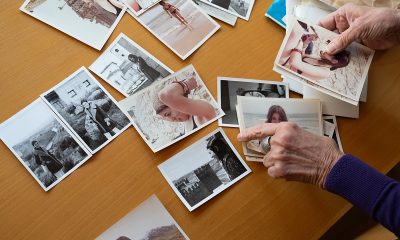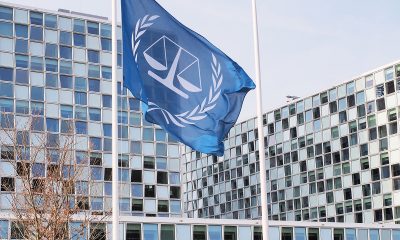Opinions
As 2013 ends, remember to give back
Year’s end a good time to reflect on those in need


As 2013 comes to a close there is optimism in the air. Our troops are coming home; the economy is improving even if not quickly enough; and even Brian Boitano, the figure skater, and the British diver Tom Daley finally came out. (Photo by Bigstock)
Having the years seem to go by faster and faster is a sign of age I am told. December whizzed by with lots of food and drink in D.C. and a few great days seeing good friends in New York. Soon the crystal ball will drop in Times Square signaling it’s 2014 and I will be a year older, maybe not wiser, but older nonetheless.
My contemporaries who connect over the holidays naturally ask, “How are you feeling?” That usually leads to a lengthy diatribe about various aches and pains and ends with, “But isn’t it great we’re still alive?” After those conversations I’m thankful for my younger friends who haven’t yet reached the stage in their life where that discussion is the norm.
This has been a good year for me and thankfully for so many of my friends. But the holiday spirit means taking a moment to think of those less fortunate. While the economy is better, too many people are still unemployed or stuck in menial and underpaying jobs. We should celebrate that in 18 states and D.C., with the recent additions of New Mexico and Utah, same-sex couples can marry. Yet, at the same time we are making great progress in gaining LGBT rights, in Russia, India and Australia things are moving backwards. We should celebrate nearing the end of the war in Afghanistan and that young men and women who have been in harm’s way will be coming home. This year saw a real chance to end the Syrian war and stop the bloodshed and even possible openings in our relationship with Iran. But clearly vigilance will be required in both countries if we are to be successful.
This year the world lost a true hero when Nelson Mandela died. But his memorial service provided the opportunity that President Obama took to shake hands with Cuban President Raoul Castro, which could lead to a thaw in relations with Cuba. This year we learned some disturbing things about the NSA from Edward Snowden, who released information on the extent of our government’s spying operations. But while I am glad that is now in the open I think Snowden should be prosecuted to the fullest extent the law allows as a traitor for how he did what he did.
Pope Francis was named Time magazine’s man of the year for taking a much more rational position on what the church should focus on and yet Catholic schools continue to fire LGBT teachers. The Advocate also named him man of the year and to me that was like giving President Obama his Nobel Peace Prize in the hope he would do something to deserve it. Clearly Edie Windsor would have been a better choice for their person of the year.
We reached the 50th anniversary of JFK’s assassination and were reminded that it was 53 years ago that we elected the first Catholic president. It took us another 47 to elect the first African American and many hope it will take a lot less until we inaugurate our first woman president.
As we look toward celebrating the New Year it is also the time to think about all those charities that do good work here at home and around the world. Time to look at the bank account and determine how much you can donate to the causes or groups that need money to continue their work. Remember you still have a few days to make donations and deduct them on your 2013 taxes so the government is actually contributing a percentage of what you give.
I always start by writing checks (yes, I still write checks) to Whitman-Walker Health, MetroTeen AIDS, SMYAL, US Helping US, UNICEF, and the Southern Poverty Law Center among others. I think of my parents who escaped the Nazis and my father’s parents who I never met because they died in Auschwitz as I write my check to the Holocaust Museum. I remember my mom as I write that check to hospice, which took such good care of her when she was dying.
We all have our favorite charities that mean something to us or our loved ones. What’s important is that we give generously to those causes in which we believe. It helps to remember that they depend on us as much as they depend on our neighbors.
As 2013 comes to a close there is optimism in the air. Our troops are coming home; the economy is improving even if not quickly enough; and even Brian Boitano, the figure skater, and the British diver Tom Daley finally came out. May you all have sweet dreams into the New Year and dream about kissing that someone you love or want to love under a bough of mistletoe.

The felon in the White House, who has lied his way to victory, has now signed his ‘big disgusting bill’ into law. He has managed to get members of Congress to agree to screw their own constituents, and vote for this abomination of a bill.
Republican members of Congress who have said it will be a disaster in their states. Who have said it will force the closure of rural hospitals, and throw seniors out of nursing homes, in their states, because they will lose their Medicaid. Who have said they oppose the bill because it will add $3.3 trillion to the deficit, which young people will suffer for in years to come. They have said they oppose it because it pretends to help those earning tips and overtime, but close reading of the fine print shows it does practically nothing for them. But because their lips are firmly attached to Trump’s ass, they voted for it anyway. It is the biggest transfer of wealth from the poor to the rich in the country’s history. Now if that doesn’t give decent people the incentive they need to fight, to take back their country, nothing will. And when I say fight, I mean with their votes.
To win, Democrats need to stop the self-immolation. Democrats are doing fine across the nation. Winning many special elections for state legislatures and the judiciary. Even when they don’t win, the margins in solid Republican districts are way down. Democrats will win governorships in New Jersey and Virginia this year. So instead of Democrats constantly talking about how bad the polls are for the party, and trashing each other, they need to focus on what it will take to win back Congress in 2026. The best way to start is to trash Republicans. I am concerned about groups like David Hogg’s PAC, and figures like Sen. Bernie Sanders, supporting candidates against sitting Democrats. Spending money and time on primaries against sitting democrats, even old ones, may not be the way to go this cycle. We need one focus — taking back Congress in 2026. That means laser like focus on which seats are winnable; open seats, and Republican seats, in both the House and Senate. Doing this is the only way we can stop the felon in the White House, and his MAGA sycophants in Congress, from doing more damage in his final two years as president. Time to face reality, that is really all that can be done for now.
If Democrats take back the House, they can stop the budget machinations Trump is trying to get done. If Democrats take the Senate, they can stop the felon from getting any more MAGA judges, or disgusting unqualified executive branch nominees, confirmed. Again, that has to be the singular focus for 2026 for anyone serious about stopping Trump. I, too, want younger members of Congress. I would urge older Democrats, those in safe districts, to voluntarily step aside. But spending millions to primary them, when in most cases history shows they will win anyway, seems counterproductive at this time. Choose the best candidates in primaries for open and Republican seats — those with the best chance of winning in the general election. I have given my support at this time to Zach Wahls, running to unseat Sen. Joni Ernst in Iowa.
Democrats must remember that most of the voters in the nation are moderate and concerned with kitchen table issues. So, while there are districts far left candidates can win, like Mamdani who just won the mayoral primary in New York City, we have seen such candidates lose in most of the country. There are takeaways from Mamdani’s win in New York for every candidate, other than everyone likes things for free. I recommend candidates look at the brilliant way he used social media. That is something Democrats around the country need to learn. People, especially young people, get their news that way these days. Then Democrats must accept the midterm elections are really local elections. They will be about what the local Democratic candidate campaigns on, and the contrast to what the Republican Party is doing for, or in most cases to, the voters in that particular district.
If Democrats do anything nationally it should be to flood the airwaves with the negatives of Trump’s bill. If done right Democrats will win. Then stop trashing Democrats who don’t agree with you on every issue. Again, stop listening to the likes of Bernie Sanders, who tells people if they don’t like everything about a Democrat, they can vote for an independent. History tells us that only helps Republicans.
Understand the most important vote any legislator makes is their first one. It determines who will control the legislature. Who will be Speaker of the House, and Majority Leader in the Senate, and most state legislatures. If the vote is for the Democratic leadership, then Democrats control the agenda, and committees. That is how to make a real difference.
Stop listening to those who claim the Democratic Party is not clear on what it stands for. The Democratic platform has been clear for years. Democrats support equality, unions, working people, Social Security, Medicare, and Medicaid. They support the right of women to control their bodies; support equality for the LGBTQ community. Democrats are for a fair immigration policy; doing everything possible to fight climate change, and protect the environment; bringing down prices for groceries, gas, and rent. If Democrats take back control of committees, in both state legislatures, and Congress, they can once again begin to move forward on all those issues.
So, stop the self-immolation, and attack Republicans. They are the enemy of the people, not a Democrat who you may not agree with on every issue. Try to move forward as a united Democratic Party. If everyone understands and does that, Democrats will win in 2025 and 2026, and will stop the felon in the White House before he totally destroys our country.
Peter Rosenstein is a longtime LGBTQ rights and Democratic Party activist.
Opinions
USAID’s demise: America’s global betrayal of trust with LGBTQ people
Trump-Vance administration dismantled agency after taking office

The U.S. Agency for International Development — proudly my institutional home for several years of my international development career and an American institutional global fixture since November 1961 — is no more.
How will USAID’s closure impact LGBTQI+ people around the world, especially in poor, struggling countries (“the Global South”)? Time will tell, but “dire,” “appalling,” and “shameful” are appropriate adjectives, given the massive increase in HIV/AIDS deaths that follow the callous, abrupt, and unspeakably cruel cut-off of funding for USAID’s health and humanitarian programming in HIV/AIDS prevention, treatment, and care.
Regarding LGBTQI+ people and issues, USAID worked in a tough neighborhood. In Africa alone, more than 30 countries in which USAID had programming still criminalize same-sex relationships, often to the point of imposing the death penalty. These fiercely anti-LGBTQI+ countries share harsh anti-LGBTQI+ punishments with most countries in the Middle East and North Africa. Other countries where USAID formerly worked retain colonial-era sodomy laws.
Where did USAID fit into all this turbulence? The agency was not allowed to transgress local laws, so how could it support the human rights of local LGBTQI+ people? USAID did so by building close and trusting relationships with local LGBTQI+ civil society, and by “superpower advocacy” for the universal human rights of all people, including those of us in the queer community.
I served at USAID’s Africa Bureau under the Obama administration, becoming the only openly transgender political appointee in USAID’s history. In that role, I was privileged to have a platform that caught the astounded attention of both queer people and of anti-LGBTQI+ governments around the world. If the president of the United States can elevate a transgender woman to such a senior position within the U.S. government, that open declaration of acceptance, inclusion, worth, and recognition set a precedent that many in the LGBTQI+ community worldwide hoped their countries would emulate.
Serving as an openly queer person at USAID also afforded me the opportunity to meet with many fiercely anti-LGBTQI+ senior politicians and government officials from African countries who sought USAID funding. Uganda’s first woman speaker of the parliament, Rebecca Alitwala Kadaga and her whole delegation came to see me at USAID in Washington about such funding. I had some very frank (and USAID-approved) “talking points” to share with her and her team about President Obama’s strong and secular commitment to equal human rights for all people. My tense meeting with her was also an opportunity to educate her as to the nature of the transgender, nonbinary, and intersex community — we who are simply classified and discriminated against as “gay” people in Uganda and in most countries in the Global South. I also had the chance to represent USAID in the “inter-agency” LGBTQI+ human rights task team led by openly gay U.S. Ambassador David Pressman, whose effective leadership of that Obama-era initiative was inspirational.
Working closely with professional, capable, and caring USAID career employees such as Ajit Joshi and Anthony Cotton, and with the strong and open support of the USAID Deputy Administrator Don Steinberg, I helped to craft and promote USAID’s very first LGBTQI+ policy. Under President Obama, USAID also created the LGBT Global Development Partnership, a public-private partnership supporting LGBTQI+ civil society groups throughout the Global South. USAID funding also increased for programs promoting LGBTQI+ inclusion, anti-violence, and relevant human rights protections. This programming expanded further (albeit never adequately funded) during the Biden administration under the able leadership of USAID Senior LGBTQI+ Coordinator Jay Gilliam and his team.
So what did it all mean? Has USAID left a footprint for the global LGBTQI+ community? Will its absence matter?
In my view, that answer is an emphatic yes. International development and humanitarian response go to the heart of recognizing, respecting, and caring about universal human dignity. USAID converted those ethical commitments into tangible and meaningful action, again and again, and modelled for the world what it means to truly include all persons.
My time serving at USAID was a high point of my career, being surrounded by the best of American civil servants and foreign service officers. For me, “USAID Forever” remains my battle cry. Let’s start thinking of how we will rebuild it, beginning in three years.
Chloe Schwenke is a professor at Georgetown University’s McCourt School of Public Policy.
Opinions
Community comes together to repair WorldPride history exhibition
Vandals damaged pictures, timeline walls on June 22

Earlier this month, vandals shouting homophobic slurs damaged the 8-foot hero cubes and timeline walls of the Rainbow History Project’s (RHP) WorldPride exhibition “Pickets, Protests, and Parades: The History of Gay Pride in Washington.” The week’s incident was the fifth homophobic attack on the exhibition chronicling DC’s LGBTQ+ History, the vandalism damage was only made worse by the storms this past week.
In response, RHP posted a call online for volunteers and donations and over a dozen volunteers showed up on Saturday to repair the exhibition in its final stretch.
It took three hours, but the group assembled during a heat advisory to bend the fences back into place, fix the cubes and zip tie all the materials together to keep them safe. Some of those who came out to volunteer, Slatt said, were known RHP volunteers but most were total strangers who had attended an event here or there or just wanted to get involved for the first time, one was even in D.C. as an out-of-town guest and after seeing the Instagram call, decided to spend their day lifting some heavy fencing back into place.
When asked why they showed up, volunteer Abbey said: “especially during Pride month, it’s so important to come together as a community, not just to celebrate, but to support each other. To know that this historic exhibit is even able to exist right now under this administration is really amazing. The fact that we’re just able to help continue it in its last leg of being out here is really important.”
“Rainbow History Project does a lot of work for the community,” another volunteer Ellie said, “they show up in a lot of ways that I think we really need right now, so in terms of being asked to come out and do a couple hours of lifting, that is something that we can easily support and do.”
“We put out a call asking for support from the community, and so we didn’t know what we’d get,” Slatt continued, “but strangers have shown up. We were upset, we were crying. We were trying to come up with a battle plan and more and more people have shown up with open arms and empty hands to do this. It’s 95 degrees, we are melting in the heat. It’s just amazing the number of people who have come here.”
If anything, the anonymous exhibit designer said, the people who vandalized the exhibit made the community stronger and mobilized members passionate about preserving and sharing our histories. Their efforts backfired in a big way — bringing together people who had only attended one or two RHP events or had read about the organization online to actively contribute to the work.
It’s a meaningful representation of the history of D.C.’s LGBTQ+ community, one that often starts with a small group of people who come together to protest but soon mobilize their communities and enact monumental change in the nation’s capital.
“If Pride in D.C. started with 10 people picketing the White House,” Slatt remarked, “you just got 12 more to join the gay history movement.”
This was especially poignant, another volunteer Mattie said, on the week that the Supreme Court issued a decision allowing Tennessee to ban puberty blockers and hormone therapy for minors seeking gender affirming care. It was a devastating moment for the LGBTQ+ community who mobilized once more in front of the Supreme Court this past Friday.
“It’s been actually really important to see this community come together in the face of direct attack on our history in the wake of direct attacks on our rights,” Mattie said, “and we stand up to that. We come together, and we represent. That is so important to maintaining our strength and our community throughout trying times now and ahead.”
When asked about how community members can support RHP’s work and repair the damage long-term to the exhibit, Slatt urged people to donate to RHP, to volunteer as exhibit monitors, and to come visit the exhibit.
“We’ve been doing this for 25 years. This is our 25th anniversary, and if it weren’t for volunteers donating their time and their talents, if it weren’t for small dollar donors, we would never have gotten anything done,” Slatt said. “I’d say to anyone out there that we are on this plaza all through Independence weekend, we are here through the Smithsonian Folklife Festival, people can come on down.”
Slatt and other volunteers will be leading tours each evening at 7 p.m. at Freedom Plaza, and people can pre-order the exhibition catalog right now, which will be delivered in time for LGBTQ+ History Month in October.
Emma Cieslik is a D.C.-based museum worker and public historian.
-

 Federal Government2 days ago
Federal Government2 days agoTreasury Department has a gay secretary but LGBTQ staff are under siege
-

 Virginia2 days ago
Virginia2 days agoDefying trends, new LGBTQ center opens in rural Winchester, Va.
-

 District of Columbia1 day ago
District of Columbia1 day agoGay GOP group hosts Ernst, 3 House members — all of whom oppose Equality Act
-

 Opinions3 days ago
Opinions3 days agoUSAID’s demise: America’s global betrayal of trust with LGBTQ people











